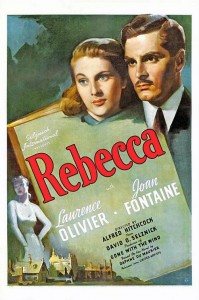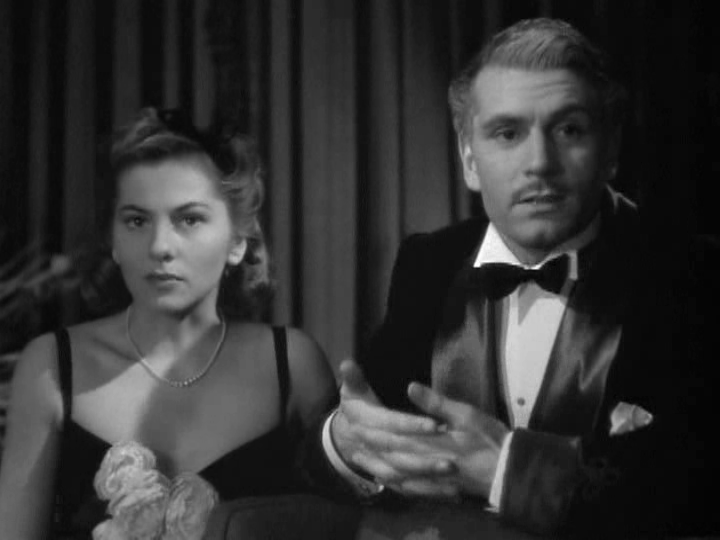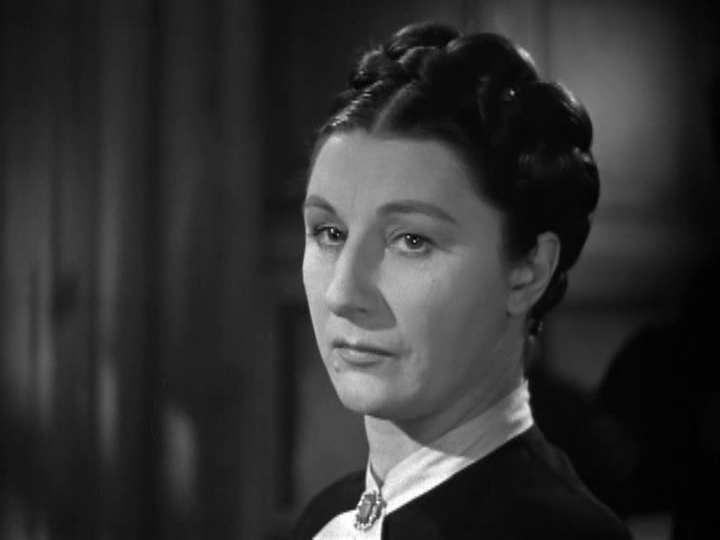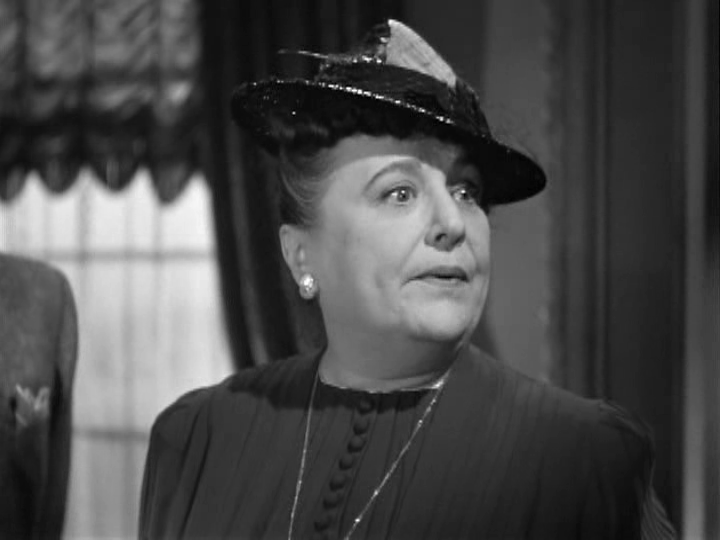Rebecca (1940)
“Marriage with Max is not exactly a bed of roses, is it?”
|
Synopsis: |
|
Genres, Themes, Actors, and Directors:
Response to Peary’s Review: If Rebecca isn’t “great Hitchcock” (it doesn’t stand among his very best work), it’s still fine entertainment. The performances throughout are uniformly excellent, with Olivier appropriately haunted and restrained as Fontaine’s brooding husband, and Fontaine perfectly portraying the brew of conflicted emotions felt by her character, who remains both nervously submissive and incredulous about her position until a pivotal shift in the plot later on (a point at which Peary argues the film “loses its power”, but I disagree). The supporting cast is fine as well, with Anderson delivering the performance of her lifetime as disturbed Mrs. Danvers (Peary refers to her portrayal as “chilling” and “soulless”); George Sanders briefly stealing the scenery in a characteristically smarmy role later in the film; and Florence Bates nicely capturing the essence of an overbearing society woman who borders on caricature but just manages to avoid this fate (listen to her conflicted reaction upon hearing about her assistant’s sudden engagement to Mr. DeWinter). A combination of appropriately spooky sets (Manderlay is a truly haunted house), George Barnes’ Oscar-winning “atmospheric cinematography”, “Franz Waxman’s moody score”, and “the clever way Hitchcock uses space so that Fontaine seems dominated by her surroundings” contribute to the film’s “amazing tension”, and turn it into a suspenseful mystery we’re eager to keep watching. Redeeming Qualities and Moments:
Must See? Categories
(Listed in 1001 Movies You Must See Before You Die) Links: |








One thought on “Rebecca (1940)”
A no-brainer must. A thoroughly captivating film experience.
~though I’m curious as to why a number of people refer to this as lesser Hitchcock. Is it because, in a way, it veers from what we usually expect from Hitch? What’s wrong with that? Is it because of the marked influence of (the odd) producer David Selznick (I mean, in the overall feel/look of the production aspect)? It puzzles me that some would not rank this among Hitch’s best films. I certainly do. I only return to it from time to time but, each time I do, I am completely swept up in it.
I will say that, although it was awarded a best pic Oscar, it does seem an odd film to take the award. A gothic romance? Not really the kind that tends to take Best Pic. But that’s fine with me.
‘Rebecca’ raises the “woman’s picture” to a uniquely satisfying level. Female viewers can derive much pleasure from the first third (the courtship) while male viewers (perhaps fidgety through the opening) can feel pulled in once the film takes a turn and grows darker. I admit I particularly enjoy the courtship sequence. There’s a charming gentleness as a relationship naturally grows between Olivier and Fontaine. The story’s exposition also allows for some very refreshing ‘comedy’, which Hitch must have enjoyed: i.e., through the character of Mrs. Van Hopper – note, for example, how Olivier slyly reveals his distaste for her by saying things about her almost under his breath.
I’ve read other works by Du Maurier but not ‘Rebecca’ and I know the film takes liberties. But, on its own terms (and problems with the censors at the time notwithstanding), I think it works rather well. The film’s script is richly textured (I esp. like Joan Harrison’s feminine touch sprinkled throughout) and it has a forceful drive.
Back to Hitch, though: his direction of actors here is top-notch: everyone (down to the smallest role) is quite good. Olivier is a particular standout. I’m not always all that impressed by him, as he seems somewhat hammy to me in a number of films – but here he is rather in control. He is marvelously paired with Fontaine (generally not wildly memorable in film). Bates is deliciously on-target as the kind of deeply (though in denial about it) frustrated control freak that you would not want to be anywhere near in real life. Sanders is dependable as always, and even Leo G. Carroll, as the doctor, is quite memorable with little screen time.
But, in a way, the film belongs to Anderson – and can that really be denied? Hers is an economical performance, and all the more menacing because of it. Which, again, brings us back to Hitch: note the scene in which Anderson gently coerces Fontaine to look down into the ocean. As well, the chilling moment during the costume party, after Olivier is angered by what Fontaine has chosen to wear (at Anderson’s suggestion): Fontaine runs upstairs, turns to look behind and, in a long shot, we see Mrs. Danvers entering a room in “my work is done” mode (a bit like Norman Bates’ mother leaving the bathroom after her ‘crowning achievement’).
I could, by the way, get quite a lot of word mileage out of Mrs. Danvers as the demented lesbian that she (is there any doubt?) is. One character states that Mrs. D “adored” Rebecca. Right. If only it were as simple as that. But, no, it’s not, by a long shot. Generally it’s quite effective that we do not see the character of Rebecca in any flashbacks. But if there’s one scene I would *love* to see, it’s Mrs. D combing Rebecca’s hair: I’d love to see the ‘playfulness’ between the two of them. And I’m sure it was somehow quite playful between those two.
Apparently this is a story Hitch very much wanted to film. (Reportedly he sought to do so years prior, but had difficulty affording the rights to the novel.) And I pretty much see him everywhere in it – right from the opening scene, in which Olivier is about to kill himself. I think the film is quite perfect actually (and marvelously shot). Yes, a real winner here!